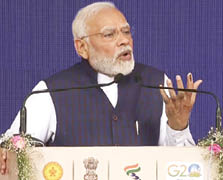The Indian Prime Minister has recast the future of Indian foreign policy as one of the critical tools in the development and growth of a great nation.
Lisbon, Portugal: As the Ambassador of Tuvalu but of Indian origin, I am often asked by fellow diplomats for my opinion on Prime Minister Narendra Modi’s influence on Indian foreign policy.
My immediate reaction is that for the first time in perhaps three decades or more, India has suddenly become visible in our neck of the woods, the Pacific. Additionally, India has stepped up its engagement with the Pacific nations, projecting soft power through training programmes, grants and support in fighting climate change. All this is obviously a part of India’s newfound assertiveness in the international arena, personified in many cases by Prime Minister Modi.
Historically, India’s foreign policy has been driven by its leadership of the Non-Aligned Movement, carefully choosing a path of least resistance, without ruffling any feathers. However, the BJP victory in the last two general elections has seen PM Modi stepping up as a transformational leader bringing about major changes, both in domestic and foreign policy. For one, PM Modi has taken a personal interest in projecting India’s image abroad. His style has been marked by whirlwind tours abroad, rock-star style appearances in packed stadiums, selfies with business leaders and bear hugs with the great and good. In most global forums, PM Modi is seen surrounded by world leaders, all basking in his bonhomie.
The question is: what has been the upshot of this type of personalised foreign policy initiatives? In my opinion, while PM Modi has been the spearhead of the new Modi-fied Indian foreign policy initiatives, he is lucky to have had a superb Foreign Minister and team backing him. I remember a Pakistani diplomat in London sharing a YouTube video of the Indian Foreign Minister, S. Jaishankar making short shrift of a BBC reporter, who had questioned him about India’s continued purchase of Russian oil, by telling her that she should return when Europe stopped buying
Russian gas. The Pakistani diplomat wrote “if only we had someone like that”.
This unique team has turbocharged India’s foreign policy which is outlined by an interesting framework. Under the present government, foreign policy has become much less ideological and a lot more practical. Focus is now on leveraging international partnerships to advance India’s domestic development. At the same time, keeping Pakistan in check and trying to counter Chinese expansionism by aligning with like-minded nations has become the norm. PM Modi has also utilised his high profile to give a new sense of pride and belonging to the millions in the Indian diaspora scattered worldwide, from Portugal to South Africa, Guyana, Fiji, Mauritius and Surinam. His invitation to Antonio Costa, Portugal’s PM of Indian origin, and the subsequent granting of an Overseas Indian passport to him was a masterstroke, which wiped out years of Portuguese-Indian animosity, a legacy of India’s eviction of the Portuguese from India in 1962.
India’s Look East/Act East policy, joining the Quadrilateral Security Dialogue with Australia, US and Japan are all aimed at countering Chinese expansionism in the Indo-Pacific. India has discreetly stepped up cooperation with Taiwan and started to push back against Chinese foreign policy initiatives amongst the Pacific Islands. At the same time, India has moved to take advantage of the disruption of the post-Covid supply chains in China by offering incentives to international companies to shift their operations to India. The recent announcement by iPhone that they intend assembling their phones in India is a triumph of foreign policy driving domestic economic development, as are the ultra-cheap loans obtained from Japan for modernising the Indian high-speed rail system.
India’s current Presidency of the G20 is a great opportunity to showcase India’s economic potential with 43 heads of delegations—the largest ever—in G20, scheduled to attend the final New Delhi Summit in 2023.
In the Middle East, a resurgent India has shrugged off Pakistan’s complaints about the “annexation of Kashmir” and has strengthened its relationship with Israel, while consolidating its friendship with the UAE and Saudi, the major players in the region. Today there is unequivocal agreement amongst Middle Eastern nations that Kashmir is an internal matter for India.
The Indo-African Summit in New Delhi and subsequent vaccine diplomacy has consolidated Indian ties with the African continent. Francophone African countries that used to look to Paris, now reach out to India for technical and financial assistance.
The present conflict between Ukraine and Russia has also indicated to the world that India does not follow an ideology-driven foreign policy. India’s stance on the war has been clearly to do what is right for its economy and people, echoing Churchill’s famous quip that “there are no permanent friends or enemies, just permanent interests”.
Many non-western countries have followed India’s lead in spite of heavy political pressure from the western alliance. Here again India has become the thought leader for the developing and “in transition” economies.
Therefore, it’s my belief that the Indian Prime Minister has recast the future of Indian foreign policy as one of the critical tools in the development and growth of a great nation.
Ambassador Shiv Shanker Nair is Tuvalu’s Envoy to The Commonwealth and Ambassador for Oceans and Climate Change. He has led Tuvalu’s campaign to recognise the legal and sovereign rights of island nations after they are submerged by rising sea levels. He has also been active in the campaign led by the Pacific nations at the International Court of Justice, to make polluting nations pay compensation to countries facing an existential crisis because of climate change. Ambassador Nair is an alumnus of the Universities of Strathclyde and Oxford. He lives in Lisbon and is a member of several think tanks focusing on his speciality of conflict resolution among sovereign nations.

